How 5 Creatives Manage Their Mental Health
For centuries, we’ve accepted the belief that creativity is connected with the burden of an unsound mind. Countless members of the fashion world have burned out, fallen from grace and, in the most tragic of cases, taken their own lives because the way the industry has often functioned – quickly, unscrupulously – has left little room for some of the most admirable talents to find peace during the creative process, let alone while they’re enduring the taxing aspects of entrepreneurship and, now, a global pandemic.
But thanks to the dismantling of discomfort around discussing mental health issues, it’s becoming less taboo to talk about the troubles experienced in one’s personal and professional lives. To inspire your own pursuit of calm and clarity, five creatives share how they’re managing, coping with and nurturing their mental health.
Adam Taubenfligel
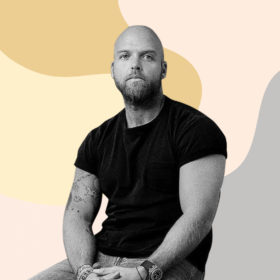
Transcendental Meditation (TM) – a mantra-centric practice done 20 minutes a day, twice a day, to be considered effective – came to Triarchy’s creative director, Adam Taubenfligel, at the most opportune time. “I was having brunch with a friend in L.A. and complaining to her about how I just never seemed to be able to snap out of the way of life that I’d always known and that it wasn’t working for me,” he recalls. “It was the same complaints over and over again, and it seemed weird that I kept doing things the way I’d always done them and wasn’t progressing at the rate I wanted to.”
His friend mentioned that post-brunch she was planning to attend an information session about TM. “I felt that I had nothing to lose,” he says of why he decided to join her. It ended up being a moment of great impact, turning Taubenfligel’s attention inward – initially in a powerful, unpleasant way. “It’s brutal because the first few days of doing it, you’re purging so much stuff that it actually manifests physically and you feel it,” he says. “I almost gave up because I didn’t want to feel like that. It was horrendous. But then you get into a groove with it, and I’ve been doing it every day, twice a day, since then.”
Taubenfligel first tried TM six years ago and says that while he always does the morning meditation as soon as he wakes up, the recommended 4 p.m. practice isn’t always feasible given his packed schedule. “It’s hard to get into because you don’t think you can dedicate the time, but when you do, it really changes your output,” he notes. “The days when I do the 4 p.m. one, it is often more effective than in the morning—there are studies that show that 20 minutes of TM give you the same benefits as three hours of REM sleep. There are times when I’ll come out of the afternoon meditation and feel like it’s a whole new day.”
TM hasn’t just given Taubenfligel a renewed sense of time during his day to day and motivated him to pursue other personally beneficial choices, like elective sobriety; it has also driven him to add the mantra “Take a deep breath. Sustainability begins with mindfulness.” to the inside of Triarchy’s ethically crafted garments.
The courses that teach someone TM aren’t free, and Taubenfligel recognizes that this can be a deterrent. But he says that knowing how his money is spent – via the David Lynch Foundation, which manages TM teachings – makes it worth it. “It goes into their programming, where they teach TM in inner-city schools and prisons,” he says, highlighting that the foundation is also able to modify course costs based on someone’s income level. “To me, that’s money well spent because it’s going to the greater good.”
Trish Ewanika
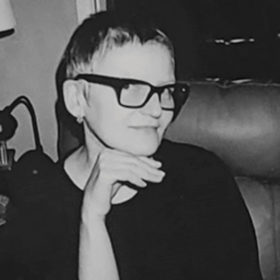
In the early days of lockdown, Trish Ewanika was dealing with the reduced pace of her fashion line’s production as well as the recalibration of orders she had placed for her eponymous boutique. Unlike in the past, when she’d typically work a 12-hour day, reprioritizing meant she could explore different ways of tending to her sense of calm. “I made sure I was home before it was dark because the streets were empty and it was weird,” she recalls of the energy shift in the typically bustling annex neighbourhood where her shop is located in Toronto.
“I’d find myself at home at six or seven o’clock – when normally i wouldn’t be home until 10 or 11 – and wouldn’t know what to do with myself,” she says. “Like a lot of people, I thought a cocktail sounded like a good idea. I’d make one, put a few olives in a bowl and then sit down to read – something i also hadn’t had the quality or quantity of time to do before.”
Noting that she would have been travelling to Palermo, Italy, in may, Ewanika soothed herself instead by “picking up The Leopard by Giuseppe Di Lampedusa and some novels by Natalia Ginzburg.” Some of the effects of quarantining in Toronto also lent themselves to transporting her to a European destination, including the fact that bars turned into bodega-style storefronts and you’d see more people picnicking in parks. “I hope some of that stays,” Ewanika says of her fondness for a less hurried way of life.
Some of it will change, though, as the winter looms, and now Ewanika – who has returned to doing pilates classes to keep her strength and balance up – is pondering other ways for her mind to escape. “I’m thinking of going back to playing the piano,” she says. a friend who takes lessons inspired her to revisit this skill, which she first studied in her youth, and she says that unlike doing crochet (another suggestion from a friend), which is “too close to her work,” plonking away at the piano is something that will keep her mind occupied in a different way than work does.
Ewanika – known for her minimalist and largely seasonless designs – is also nurturing aspects of simplicity and slowing down when it comes to her work life. “Time isn’t ours to manage the way it used to be,” she says, highlighting how much longer things in her business operations take because of delays and virtual hiccups. “You have to give yourself a break on that account. now, I’ll pack up and leave at eight and say ‘it’ll just have to wait until tomorrow’ because my health and mental well-being override anything that feels urgent at the moment.”
Lauren Chan
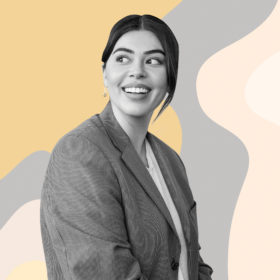
“I started therapy around the time that I launched Henning,” says Lauren Chan, a New York-based entrepreneur in the plus-size space. “I decided to do it because I was very stressed out. It was also something that I had heard a lot of female founders talking about—the necessity of keeping yourself well when you’re running a business.” It also helped that in her circle, seeing a therapist wasn’t something to be shy about. “In New York City, it seems like everybody has a therapist, and it’s very normalized in a really beautiful way,” she notes. “Perhaps I notice this because I surround myself with progressive, creative people who want to be in tune with that side of themselves and have that aspect of wellness in their lives.”
She used two digital platforms – Psychologytoday.com and the app Talkspace – to find a mental health professional she felt she could trust and who would understand her. While she used to see her therapist at their office near Washington Square Park, quarantine has forced Chan’s sessions to move online for the foreseeable future; it’s a circumstance that initiates a helpful way of framing the many roadblocks one can encounter in a day. “I can’t control the timeline of when I’m going to physically be back in an office with somebody,” she says. Chan further highlights the ways in which seeing a therapist has helped her reconsider her approach to her work life, which she says had been causing her to lose “the ability to compartmentalize and cope in a lot of ways.”
“The biggest lesson I’ve learned through therapy is to be a little less forward-thinking and to reel back some of the ambition and competitiveness that comes from having a work personality like mine; it has helped me to be a little more considerate and to feel more level,” she says. “It ended up being great timing because now we’re in a massive slowdown in the fashion industry, and these tools, which I had been working on for almost a year prior to the pandemic, have been incredibly helpful,” she says about starting her sessions after kicking off her business in the fall of 2019. “I don’t know – and I don’t want to know – how deeply stress would have affected me during this crisis for small businesses over the past six months.”
Lesley Hampton
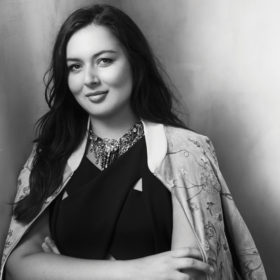
Toronto-based designer Lesley Hampton has relied on physical activity throughout most of her life to preserve a sense of determination, clarity and focus. “I started horseback riding every weekend at the age of seven,” she says, adding that when she moved from Canada to Australia as a teenager, she enrolled in a school that had an equestrian program. The mental and physical conditioning required for competitive sports proved useful during her adolescence and provided the self-starter spirit that she needed to found her eponymous fashion brand in her early 20s.
Hampton’s design work has been deeply influenced by her athleticism and her efforts to keep fitness part of her daily routine as her body changed. She says that navigating her feelings toward the typical visuals of what a “physically fit” person looks like is an ongoing obstacle. “Once I grew past the Xl size, it was harder for me to put myself out there in workout clothes,” she says. “It’s something i still struggle with.”
Musemo Handahu
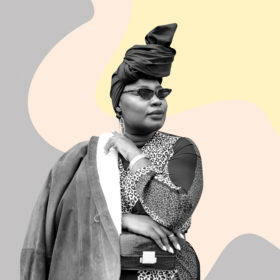
As someone who lives their life on the internet, content creator Musemo Handahu has self-care practices that are intrinsically linked with her career. The Halifax-based fashion blogger, who has over 50,000 followers on Instagram, makes an effort to share how she mitigates the impact of not only the large-scale anxieties of 2020 but also more individualized issues.
“I’m really struggling right now,” she says about the restrictions that quarantine has resulted in. “Travel has always been my most important method of self-care, and not having that has started to take its toll on me. It doesn’t only boil down to seeing family and my best friends; travelling also allows me to experience really important moments of Blackness and Black culture. That’s important to me because where I live, there aren’t a lot of people of colour who are creatives. You can feel like the city is erasing you in some way. Now, I’m wondering, ‘What’s the next step for survival?’ And I wonder if other Black people who live here are feeling the same way.”
To offer insight into how she combats the feelings that come along with this notion of erasure, Handahu is candid about her coping mechanisms. She took up cycling in the summer and was pleased by the unexpected results. “Initially, it was going to be my form of exercise,” she notes. “But when I started riding my bike, it changed to just wanting to get some air. I’m not necessarily concerned about burning calories but about feeling some sort of freedom.” And in an Instagram post in late August, Handahu posted about “the things [she needed] to do to get through a day,” which included “cried – a lot” and “laughed – a lot.”
She divulges this information to give a more well-rounded perspective of herself on her social media feed—something she thinks her community is craving now more than ever. “I think people view me as someone who has a lot of confidence,” she says. “Being transparent about bawling my eyes out shows a level of relatability to my followers. I think we’re all tired of perfection – of always seeing these
put-together people and having this idea that they don’t go through things, when that’s not the case.”
Revealing her need for moments of levity is equally important to Handahu. “It’s about allowing yourself the grace to actually step away from something that’s over- whelming and giving yourself a moment to breathe – that’s what laughter represents to me,” she says, adding that she’ll hang out with a funny friend or watch a stand-up comedy show when she needs a mood-lifting break. “It’s me saying ‘Yes, the world is really screwed up right now, but I need to have a moment of joy. I’m going to take that for myself.’” Handahu notes that it’s important to remember that when you’re opting to take time for these moments, be they happy or sad, being purposeful about it is key. “You shouldn’t feel guilty for allowing yourself to step away for a bit,” she says. “We can’t always be carrying the burden of what’s happening in the world 24/7. It’s not healthy.”
The post How 5 Creatives Manage Their Mental Health appeared first on FASHION Magazine.